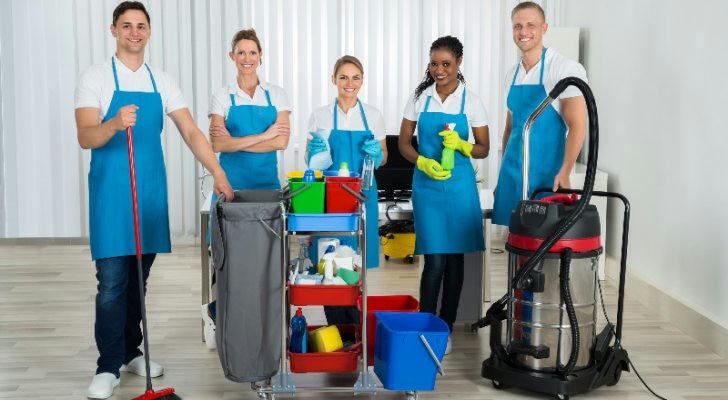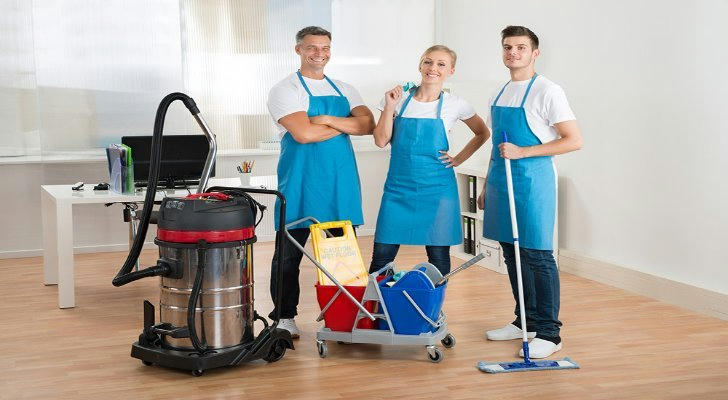2025 Cleaner Job Guide
Cleaners play a vital role in modern society, maintaining the cleanliness and hygiene of public and private spaces. As people's living standards improve, the importance of clean and sanitary environments has also increased, making the profession of cleaners increasingly popular. This article will explore why you choose the profession of cleaners, the types of cleaners, factors that affect wages, actual wages and benefits, and how to find a job as a cleaner.

Why Choose a Cleaner
There are many reasons for choosing to become a cleaner, which can be summarized as follows:
Stable employment opportunities: According to the U.S. Bureau of Labor Statistics, the number of employed cleaners reached approximately 2.7 million in 2022 and is expected to grow by 5% by 2032. This growth is mainly due to the continued increase in demand for commercial and residential cleaning, which has brought more job opportunities.
Low entry barriers: Becoming a cleaner does not usually require advanced education or professional skills. Many positions only require basic training and are suitable for people who do not have specific professional skills.
Flexible working hours: Cleaning work generally involves different time arrangements, including full-time, part-time and night shift work, with high flexibility to meet the needs of different groups of people.
Positive impact on society: The work of cleaners is essential to maintaining public health and a clean environment, creating a healthier living and working environment for the community and society.
Types of cleaners
The types of cleaners can be mainly divided into the following types:
Residential cleaners: responsible for the daily cleaning and maintenance of residential houses, including sweeping, tidying, laundry, etc. This type of work is usually privately hired and has high flexibility.
Commercial cleaners: work in public places such as offices, shopping malls, schools and hospitals, responsible for large-scale cleaning tasks, including floor cleaning, table and chair wiping, garbage removal, etc.
Special cleaners: including hazardous materials cleaners, building cleaners, etc., usually need additional training to handle specific environments or items. The salary for this type of position is generally higher.
Hospital cleaners: working in hospitals and medical institutions, they must follow strict hygiene standards to ensure the safety and cleanliness of the environment. This type of cleaner usually requires certain professional knowledge.
Factors Affecting Cleaners' Salaries
Cleaners' salaries are affected by a variety of factors, including:
Work experience: Experienced cleaners usually earn higher salaries. Depending on the level of experience, salaries can range from $25,000 to $45,000.
Geographic location: Salaries vary significantly between regions. For example, in areas with high costs of living, such as New York and California, the average salary of cleaners tends to be higher than the national average, at around $35,000.
Type of job: Commercial cleaners usually earn more than residential cleaners, and specialty cleaners (such as hospital cleaners) earn more because they have to follow special regulations.
Type of employer: Large companies and professional cleaning service companies usually offer higher salaries and better benefits than small businesses.

Cleaners' salaries and benefits
In terms of salary and benefits, cleaners are as follows:
Salary level: According to the U.S. Bureau of Labor Statistics, the average annual salary for cleaners in 2022 is about $32,330, and the specific salary varies by region and employer.
Benefits: Most cleaners receive benefits such as health insurance, pensions, and paid vacation. According to PayScale, about 70% of cleaners have health insurance benefits.
Overtime pay: During certain high-demand periods, such as holidays or weekends, cleaners often receive additional overtime pay, further increasing their income.
How to find a cleaning job
There are many ways to find a cleaning job:
Online recruitment platforms: Websites such as Indeed, Monster, Glassdoor, and CareerBuilder provide a large number of cleaning job postings, and job seekers can filter by location and experience.
Local cleaning company websites: Go directly to the official website of a local cleaning company to often find the latest job postings.
Employment agencies: Local employment agencies can often provide job seekers with effective recommendations and resources to help them find the right cleaning job.
Social media and networking groups: Look for information in relevant groups on platforms such as Facebook and LinkedIn to communicate with peers and get job recommendations.
Community bulletins and job fairs: Many community centers or career fairs provide job postings for cleaning positions, which is a good opportunity to contact employers directly.
Conclusion
Cleaning is an important profession for maintaining social hygiene and a clean environment. The demand for cleaning continues to grow, providing stable employment opportunities and competitive salaries. People who are interested in this profession can better grasp career development opportunities by understanding the types of cleaners, salary structures, benefits, and ways to find jobs. In today's society, cleaners are not just a job, but also an important guarantee for providing us with a clean and healthy living environment.
